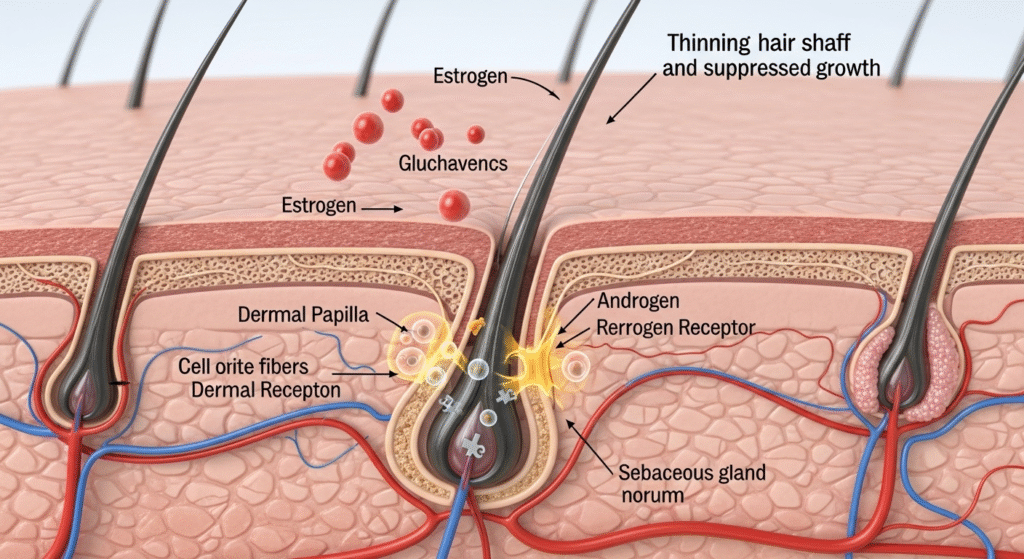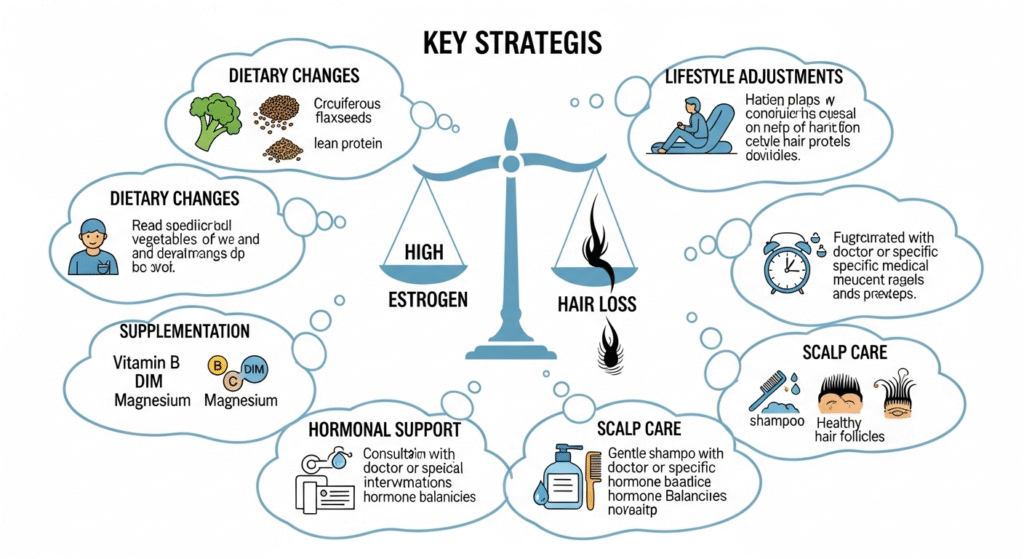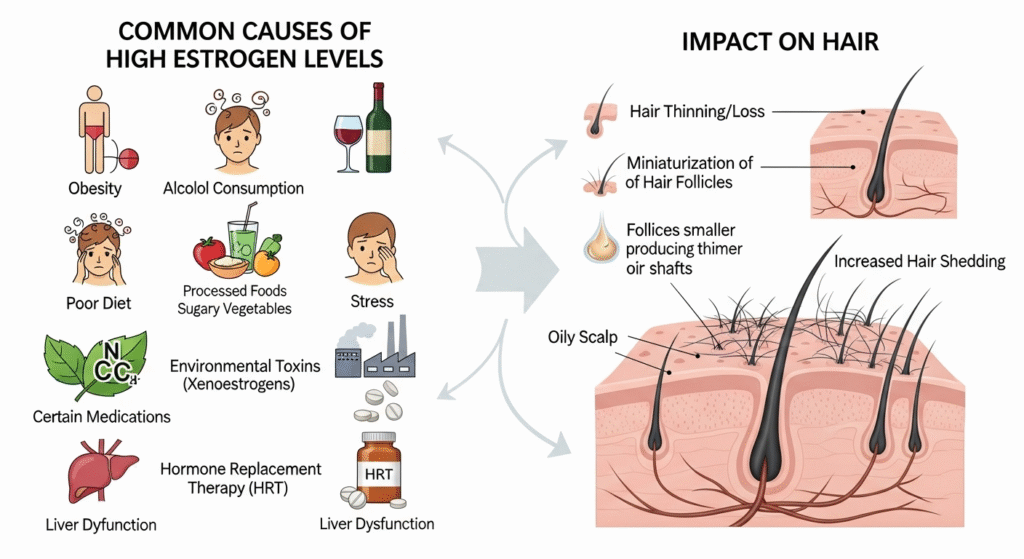If you're experiencing hair loss and suspect that your hormones might be to blame, high estrogen levels could be a significant factor. While estrogen is crucial for healthy hair growth, an imbalance particularly high estrogen levels can contribute to thinning hair or excessive shedding. In this article, we’ll explore How High Estrogen Levels Can Lead …
If you’re experiencing hair loss and suspect that your hormones might be to blame, high estrogen levels could be a significant factor.
While estrogen is crucial for healthy hair growth, an imbalance particularly high estrogen levels can contribute to thinning hair or excessive shedding. In this article, we’ll explore How High Estrogen Levels Can Lead to Hair Loss, common causes, treatments, and expert recommendations to restore your hair health.

Understanding the Role of Estrogen in Hair Growth
What is Estrogen?
Estrogen is a hormone that plays a critical role in various body functions, including reproductive health, bone strength, and hair growth. It is primarily produced in the ovaries, although small amounts are made in the adrenal glands and fat tissues. Estrogen helps to maintain the growth cycle of hair follicles, keeping hair in its growth phase (anagen) longer, promoting fullness and health.
In women, estrogen levels naturally fluctuate, especially during menstruation, pregnancy, and menopause. High estrogen levels can impact not only your hair but also your overall health. When estrogen is in balance, it encourages healthy hair growth, but when levels are too high, it can result in the disruption of the hair growth cycle.
The Relationship Between Estrogen and Hair Health
Estrogen promotes hair growth by prolonging the anagen phase of the hair cycle. This phase is when hair follicles actively grow hair. High estrogen levels help prevent hair follicles from entering the resting phase too quickly, leading to a thicker and fuller appearance. However, when estrogen levels exceed normal limits, the body may begin to experience hair thinning or shedding as part of an imbalance.
How High Estrogen Levels Can Lead to Hair Loss
Hormonal Imbalance and Its Impact on Hair
High estrogen levels can disrupt the normal hormonal balance in the body, especially when estrogen is out of proportion with other hormones like progesterone and testosterone. This hormonal imbalance can lead to hair thinning or excessive shedding. Estrogen dominance (where estrogen levels are disproportionately high compared to progesterone) is a common cause of hormonal hair loss.
Several factors can cause high estrogen levels, including:
- Hormone Replacement Therapy (HRT): Some women undergoing HRT for menopause might experience elevated estrogen, leading to hair thinning.
- Pregnancy: During pregnancy, estrogen levels are naturally elevated, which can cause changes in hair growth cycles.
- Obesity: Increased fat cells can lead to more estrogen production, which could lead to estrogen dominance.
Estrogen Dominance and Hair Loss
Estrogen dominance occurs when the body has an excess of estrogen in comparison to other hormones. This imbalance can cause a range of symptoms, including hair thinning, headaches, and mood swings. When estrogen is dominant over progesterone, it may affect the scalp’s health and lead to telogen effluvium, a condition that causes temporary hair shedding due to a disruption in the hair growth cycle.
Common Causes of High Estrogen Levels and Their Impact on Hair

Birth Control Pills and Hormone Therapy
Hormonal contraceptives, including birth control pills, contain synthetic forms of estrogen. While these pills are effective at preventing pregnancy, they can also affect hair growth. Many women experience changes in hair texture or hair loss when starting birth control or switching pills. The synthetic estrogen in these medications can increase estrogen levels in the body, potentially leading to hair thinning or shedding.
Similarly, hormone replacement therapy (HRT) used for menopause can result in elevated estrogen levels, which may also contribute to hair thinning.
Pregnancy and Postpartum Estrogen Fluctuations
Pregnancy causes a natural increase in estrogen levels, leading to thicker hair for many women. However, after childbirth, estrogen levels drop dramatically, which can lead to postpartum hair loss. This shedding typically begins a few months after delivery and can last for up to a year as the body adjusts to hormonal changes.
Estrogen-Producing Conditions and Their Effects
Certain medical conditions can cause high estrogen levels. Conditions like polycystic ovary syndrome (PCOS), ovarian cysts, and obesity can increase estrogen production, which could lead to hormonal imbalance and hair loss. In some cases, these conditions might also cause an increase in testosterone, which can worsen hair loss by promoting male-pattern baldness.
How to Manage High Estrogen and Prevent Hair Loss

Addressing the Root Cause of Hormonal Imbalance
The first step in managing high estrogen levels is to identify the cause. Whether it’s due to medication, a medical condition, or lifestyle factors, working with a healthcare provider is essential. Blood tests can help determine estrogen levels, and once the root cause is identified, the necessary treatments can be implemented.
Effective Treatments for Hair Loss Caused by High Estrogen
Once high estrogen levels are addressed, hair regrowth treatments can be implemented. These treatments might include:
- Minoxidil: A popular topical treatment that can promote hair regrowth in areas of hair thinning.
- Spironolactone: A medication that blocks the effects of excess estrogen and testosterone on hair follicles.
- Dietary Supplements: Taking vitamins like biotin, vitamin D, and zinc can support hair health and help improve the quality and growth of hair.
Natural Remedies for Balancing Estrogen Levels
Natural remedies can help balance estrogen levels and reduce hair loss. Herbal supplements such as chasteberry (Vitex) and flaxseed have been shown to help balance estrogen and progesterone. Additionally, drinking spearmint tea or incorporating adaptogenic herbs like ashwagandha can support hormonal balance and improve hair health.
Pro Tip: Always consult your healthcare provider before starting any new supplement regimen.
Expert Opinions on High Estrogen and Hair Loss
How to Restore Hair Health After Estrogen Imbalance
Hair regrowth after high estrogen-induced hair loss often requires a combination of treatments. It’s crucial to address hormonal imbalances, either through medication or natural remedies, and to follow a healthy hair care routine. Experts recommend avoiding harsh chemicals, maintaining a nutrient-rich diet, and staying hydrated to help restore hair growth.
FAQs
Can High Estrogen Levels Cause Permanent Hair Loss?
No, high estrogen levels typically cause temporary hair loss. However, if left untreated, prolonged hormonal imbalance could lead to permanent damage to hair follicles.
How Can I Know if My Estrogen Levels Are Too High?
If you experience symptoms like hair thinning, fatigue, or irregular periods, it’s important to get a blood test to check your estrogen levels and consult with a healthcare provider.
What Are the Best Ways to Lower Estrogen and Prevent Hair Loss?
Lowering estrogen naturally can be achieved through dietary changes, exercise, and supplements that support hormone balance. In some cases, medication may be required to treat high estrogen levels.
Can Hair Grow Back After Estrogen Imbalance is Treated?
Yes, once estrogen levels are balanced, hair growth can resume. However, it may take several months to see noticeable regrowth.
Conclusion: Regain Control of Your Hair Health with Hormonal Balance
High estrogen levels can contribute to hair loss, but the good news is that it is treatable. By understanding how high estrogen affects your hair, seeking the right treatments, and making lifestyle adjustments, you can restore your hair health and prevent further hair loss. If you believe your hair loss is due to high estrogen, consult a healthcare provider to address the root cause and take the next steps toward recovery.
Ready To Take Your Next Step
If you’re concerned about hair loss due to hormonal imbalance, book a consultation with Dr. Uzma Irfan, an ISHRS-certified surgeon in Islamabad today to discuss how we can help balance your hormones and restore your hair health.






